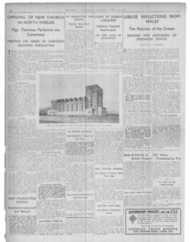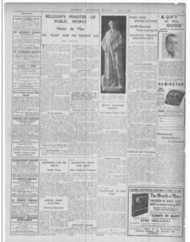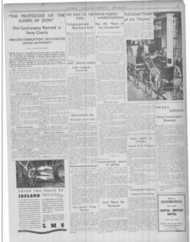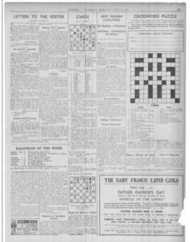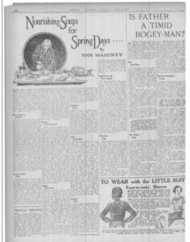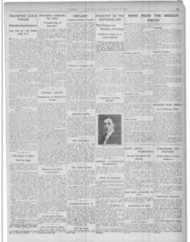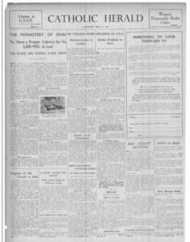Page 13, 11th May 1935
Page 13

Report an error
Noticed an error on this page?If you've noticed an error in this article please click here to report it.
Tags
Share
Related articles
"i Respectfully Salute You
The Leade Ship Of Youth
Writers And Religion
The Priest As Craftsman
Evelyn Waugh And His Touchy Dilemma Over Evil
THE CATHOLIC NOVELIST Does He Exist?
HOW SHALL WE KNOW HIM?
By G. M. Turnell
AWRITER in the Colosseum lately Made his notice of Mr Evelyn Waugh's novel, A Handful of Dust, the occasion for demanding that "the "problem of the Catholic novelist, or rather of the Catholic who writes novels, should be thrashed out in England with the same thoroughness as it has been in France." For, as the writer went on to point out, this is the only way of preventing the work of Catholics from being subjected to "crude reviews in the Catholic press which are as unedifying as they are Silly." I think we must begin by asking—the reviewer in question implies that. there is a doubt-whether there is a Catholic novelist or a Catholic novel at all, any more than there are Catholic painters or Catholic plumbers. There are Catholics who paint and Catholics who plumb, but is the work of the Catholic who writes novels distinctively Catholic any more than the painting of Cezanne or of the Catholic who mends the pipes? And if it is, is it really desirable that it should be so?
Catholic Novelists—Not Catholic Novel
In a valuable symposium on the subject in La Vie Intellectuelle, one writer states emphatically that there are Catholic novelists but no Catholic novel. "To admit the existence of a specifically Catholic novel," he writes, "would be to posit a new s.nd false literary genre." No one who is familiar with contemporary literature, with Mauriac, Gertrud von le Fort, or Kiihnelt-Leddihn, can doubt that there are Catholic novelists and they are so for particular reasons. They are not Catholic novelists simply because they Are Catholics, or because they write about specifically Catholic subjects (there is mercifully little about priests and church-going in Mauriac). They are Catholic novelists because, whatever their subject-matter, they succeed in expressing towards the world in which they live an attitude that is wholly and uncompromisingly Catholic. "The Catholic artist," writes Henri Massis, "portrays nature informed by grace, not simply that stunted and Material reality which only appeals to
our sensibility. His subject is the divine reality, living and autonomous, which fixes itself in our minds and fills our hearts."
Four Kinds of Writers
The Catholic novelist is Catholic because his outlook is richer, more positive, than that of other vvirters. It is this that we have to bear in mind in distinguishing him from writers who simply on account of superficially Catholic elements in their work are often taken for Catholic novelists. I think we can distinguish four kinds of Catholic writer. (1) The Catholic novelist properly speaking; (2) Catholics who write novels without expressing a specifically Catholic outlook (Mr Maurice Baring, Mr Evelyn Waugh); (3) Novelists, whether Catholics or not, who deal with Catholic subjects (Miss Willa Cather, author of Death Comes for the Archbishop; Miss Helen Waddell, author of Peter A Ward): (4) The confessional novelist. (Here it would be invidious to mention names,)
This is a rough and ready classification. Some writers like Mr Baring or the late Mgr. Benson would clearly fit equally well into 2 or 3.
The Negation of Catholicity—
The case of the confessional novelist is more important; for his work is very often mistaken, at any rate in England, for the so-called Catholic novel, though it is really the absolute negation of Catholicity. The French writer is correct in hie view that to admit the existence of a Catholic novel is tantamount to admitting that Catholicity is a special department of life with a literature of its own. From a Catholic point of view, such an admission is of course untenable. But it is unfortunately one which is tacitly made in scores of confessional novels which pour from the press in England. The confessional novelist is sectarian, as the Catholic novelist is not and cannot be; for though some Catholics are sectarian, Catholicity and sectarianism exclude one another. The Confessional novelist encourages the reader to feel not as a member of the 'Universal Church, but as a person
apart. His interest centres round rites, ceremonies and church-going-round all the outward signs which distinguish Catholics from other people. The Catholic novelist is not, of course, precluded from writing about rites and ceremonies as long as he is careful not to give them undue importance.
—And a Monstrous Travesty of Life
The confessional novel is bad and dangerous because of its blatant falseness. It distorts life and is false in its presentation of emotion. It transforms the Church into a miserable priest-ridden sect. It aims at edification and succeeds only in giving the reader a monstrous travesty of life--a picture of pious Catholics and wicked ProLestauts. It is bad because VI Malign Vast maniatructed =ad= ta.
indulge in the cheapest and most degrading forms of emotionalism. It is distressing to think that people who shudder at the mention of Miss Ethel M. Dell are overcome with admiration when they meet one of her "strong silent men" in the habit and cowl of a monk.
The French View
Tho confessional novel, then, is an offence against truth. That the Catholic novelist should tell the truth about fallen man, that he should not conceal wickedness and vice for the purpose of edification, nor the workings of grace out of respect for the unbeliever, is regarded as axiomatic by nearly all the French writers who have written about the Catholic novelist. Truth, as Marititin and Charles Du Boa (whose Francois Mauriac et le problems du romancier catholique is the classic work on the. subject) insist, is sacrosanct.
This insistence on truth is a point of capital importance; but there have been abuses. Some French novelists are inclined to weigh and measure to see how much corruption can be crammed into a novel without forfeiting the title of Catholic novelist. In The Dark Journey, for instance, M. Julien Green describes a world in which religion is implied by the complete irreligiousness of its inhabitants, and the existence of good by the badness of man.
The Test The real Catholic novelist is not Catholic in this negative sense. If he were, there would be no excuse for bothering about him at all. His first duty is that he should himself be wholly and completely Catholic, for only in this way can his view of the universe be transfigured by Catholicity. That is: in everything he does or writes he must be a Catholic. There must be no distinction between the man who goes to Mass and the man who writes. If a man really is a Catholic, everything he writes bears inevitably the stamp of Catholicity. If it doesn't, it means that there is that fatal separation between religion and life, which is one of the chronic diseases of the modern world, The Shadow Over All Mauriac is the perfect example of the Catholic novelist precisely because there has never been a separation between the Catholic and the novelist. They are and always have been one. The shadow of the Cross falls across every page that Mauriac writes. On the other hand, one feels in the case of writers like Mr Baring, or that very painstaking and hardworking novelist, Sigrid Undset, that there is a sort of gap between the Catholic and the writer, which they try a little selfconsciously to bridge. Their Catholicity is not inevitable as Mauriac's is; it is worn like a new, rather fashionable but not very well-fitting, costume. One feels that Catholicity is not the directing principle, but something worked in from without.
Writers in Bad Faith It goes without saying that the Catholic novelist's presentation of life must be free from anything that conflicts with the Catholic view of life. This brings us to the delicate point of whether the Catholic artist must be a practising Catholic or not. Eric Gill replies unhesitatingly that he need not be. But Eric Gill would be the first to admit that, practising or not, he must feel as a Catholic. Now, we often meet, particularly in France, with writers who have been Catholics but are no longer so, though their work shows unmistakable signs of their upbringing. My own opinion is that though he died a Catholic, we could never describe Baudelaire as a Catholic poet. Nor can we call James Joyce, one of the greatest writers now writing in our language, a Catholic novelist. For the work of these men is only intelligible when regarded as the work of writers who have been Catholics, but are no longer Catholics.
Non-Christian Novelists
Now, if to be a Catholic novelist implies a certain exclusion, it is only in order to be ultimately more coraprehensive, more positive than other writers. This is well brought out in a remarkable essay called De la foi by Jacques Riviere, the great Catholic critic. "There is," he said, "a sort of naiveté about every non-Christian I writer. He is rather like someone from whom something is hidden without his suspecting
The distinction has seldom been better put. The Catholic writer's vision is more profound, his conception of life richer, than the unbeliever's. Only the Catholic sees the whole of life, the full stature of man. Indeed, it is precisely on the differing conception of the nature of man that Riviere concentrates. In a comparison between Dostoevsky and Stendhal he goes on to say: "Stendhal's characters are individuals, not creatures. . . . They are nothing but the sum of their passions. . . . One cannot wish them to be forgiven. . . . One could never pray for them. They are complete, self-contained. They are without that
AN AGE-OLD PROBLEM AND CHRISTIAN THEOLOGICAL TEACHING
The Spiritual Letters of Abbot Chapman, Fourth Abbot of Downside. Edited with an Introduction by Dom Roger Hudleston of the same Abbey. (Sheed and Ward. 8/6.)
THIS work falls, roughly, into two main divisions. The first, letters addressed to lay folk and to religious, the second addressed to a Jesuit. The former deals with personal problems, mainly problems connected with prayer. The second, equally arising from a personal need, gives a masterly outline of Christian theological teaching showing how it differs from, and completes, philosophical speculation, taken in its strictest sense.
Joining Hands With Saints
The Abbot, a man of outstanding gifts with a passionate love for truth, devoted much attention to an Important, most practical but difficult problem in the spiritual life. Most earnest people who try and devote their lives to the service of God find, after a time, that their normal method of prayer, commonly called meditation (understood in the widest sense) becomes difficult or impossible. The result may be confusion, doubt, or a depressing sense of failure. The Abbot sought to elucidate this difficulty both theoretically and practically. Obviously the subject has been dealt with repeatedly by saints and spiritual writers, but it is one of the characteristics of the spiritual life in different ages that it needs contemporary directors and guides who can apply by voice and example the substance of what saints and mystics have written in the past. The angle of approach varies slightly from generation to generation, the manner of life and general outlook; and a natural humility often prevents people realising that what they read is, in fact, true of and for themselves. So Abbot Chapman, having once satisfied himself of the truth, in these letters applies over and over again to anxious Souls the teaching he found in St John of the Cross, St Francis de Sales, Pere de Caussade, Pere Grou, etc.
Inspiring Confidence He had a sureness of touch. and an insight, that was of supreme use to those who sought his help. This was reinforced by an originality of manner and touches "of an almost fantastic wit" that made the deepest impression. He was so eminently sane and could write, "We should hate thinking about our own 'spiritual state,' our own part should be (1) to think of others (2) to be with God." "Humility in oneself is not attractive, though it is attractive in others." "A contemplative must never be resigned to God's Will, but will it." "The one devotion is simply God's Will." "Which is the greater love: 'I enjoy thinking about the Passion' or 'I can't bear to think about It'?" Speaking of contemplative prayer he says: "It is as easy as jumping into a fire, which you had not seen, and has the same effect. It burns your clothes first, then your flesh, and then your bones."
A Spiritual Classic But his real work was the reassuring of souls when they entered into that stage of the spiritual life where prayer seems to fail and the action of grace in the soul is so hidden, subtle, unaccustomed that they fear to surrender themselves to it. He fulfilled this great and urgently necessary task with a marvellous sureness and enlightenment. There is a directness, a simplicity, a learning. an absence of clichas, combined with a deep spirituality, that places the book immediately (so at least it
seems to the writer) amongst the classics of spirituality.
Scholastic Philosophy and • Catholic Theology
The "Letters to a Jesuit" perform another task. It would seem that the Abbot's correspondent had had certain spiritual graces that had, as It were, given him a short cut to that realisation of the presence, power, action of God in the individual soul, as in creation as a whole, that normally is attained by long reflection supplemented by prayer. Experience outstripped knowledge, so that he sought in philosophy What theology, reinforcing a sound philosophy, alone could give. He was tempted to take the easier way, to find rational verification in the idealistic philosophers (always interpreted optimistically in the light of his individual experience) current outside the Church.
The Abbot, with an amazing clarity and charity, sought in a series of letters to state the true position of scholastic philosophy and how it prepared for, and was completed by Catholic theology. He pointed out the dangers of a philosophic eclecticism (more especially, perhaps, when coloured by a subjective experience) and how a sound intellectual position could only be achieved by a thrashing out of fundamental principles. In order to do this he wrote "a huge series of papers of theology—a theodiey—a theory of the world on the Christian hypothesis": it is of quite exceptional value and might well be of the greatest use to those many men of goodwill who look to-day for help In understanding the Christian position.
A Seeker After Truth The letters betray a sympathy with difficulties, a profundity and breadth and originality that are rarely combined. In other letters to the same correspondent he seeks to clarify and complete his own theory of mysticism. The differences, apparent or real, that seem to exist between the teaching of St Teresa and St John of the Cross (although, of course, St John approved St Teresa'n writings and recommends them in the Spiritual Canticle), the function and place and meaning of the "obscure contemplation." that is so important in the earlier stages of the mystic's progress.
The Abbot was not afraid to go back upon an opinion, once he found reason to do so. His sole interest. was the truth. It must be remembered that none of these letters
were written for publication. In one letter he asks that it may be read "devoutly and in a kindly and uncritical spirit. I am not infallible . . . But I always try to be orthodox first of all." The Abbot's leaflet called Contemplative Prayer and an article entitled "What is Mysticism?" which first apeared in the Dublin Review, are reprinted as appendices. There is an admirable preface and memoir of Abbot Chapman.
wound which the incarnation left on human nature. They are entirely unrelated to one another.
[ "The characters of Dostnevsky, on the contrary, have a depth which is absent in Stendhal's. They are men, but men with the divine spark. They do wrong, yet there is something more
In them than their passions it is that image of God which, however faint it may have become, will never disappear. ... What they recognise in one another Is that they are brothers in Christ."
The Void in Modern Fiction
"One could never pray for them." It is an illuminating phrase, and though it is not alone sufficient to distinguish between Catholic and non-Catholic novelists, it does help us to understand what is lacking in the modern novel as a whole. It is that third dimension of which Charles Du Bos has written. It explains not only the spiritual emptiness of much modern writing, but the superiority of Catholic novelists in their insight into human hearth. (Mauriac is a much better psychologist. than Lawrence ever was.) We could pray for a character of Mauriac's but not for those of Mrs Woolf, nor for Mr Waugh's puppets. It would hardly occur to us to pray for D. H. Lawrence's characters. One could, perhaps, manage a prayer for James Joyce's Stephen, but not for Mr Bloom. And there is one character in Brave New World for whom one might pray. But only one.
The Biggest Problem I have left until last the most difficult and delicate problem of all, the problem of the moral responsibility of the Catholic novelist. It is well to insist on the sanctity of truth, hut if the portrayal of vice causes others to
stumble? It is a problem which has greatly exercised Mauriac as we as the other contributors to the Byrne posium in La Vie Intellectitelle, If a man is a Catholic, if he has that "purity of vision" on which Mauriac Insists, be can deal with any subject, But though the writer is not immediately responsible for the effect of his work on uninstructed people, the question of their possible effect in the wrong hands does have to be faced. There are passages in some of Mauriac's own books that scandalised French Catholics. It seems to me that it is precisely his breadth of vision and his sense of the absolute difference between right and wrong that leads the Catholic novelist into dangerous places. The dangerous pages in Bourget's Le disciple or Mauriac's own Fleuve de feu are those which describe ,temptation. For temptation as an experience exists only for the Catholic novelist. For the pagan writer it has no meaning.
This is another of the differences between Mauriac and Lawrence. What is dangerous to the reader is the alluring picture of man succumbing to temptation for the sake of doing wrong. of man delighting in his own moral collapse. Yet this is so peculiarly a feature of modern psychology, that it is hard to see how it could be omitted from the work of a writer who sets out to tell the whole truth.
None of the French writers has found a solution. Personally, I do not see how one can have it both ways. Perhaps Maritain's is the only answer. "Our Lord looked into the eyes of the women taken in adutery. Only Ha could do so without contamination. Every novelist looks without flinching into those poor eyes and invites his reader to share the spectacle."
blog comments powered by Disqus



